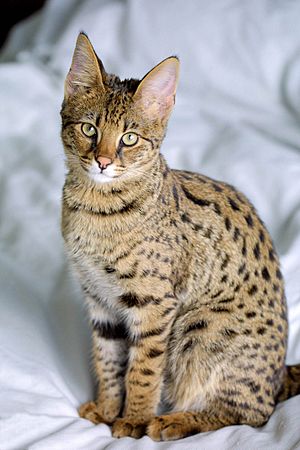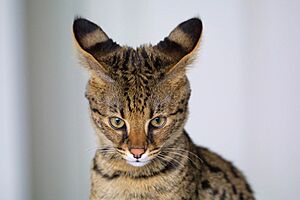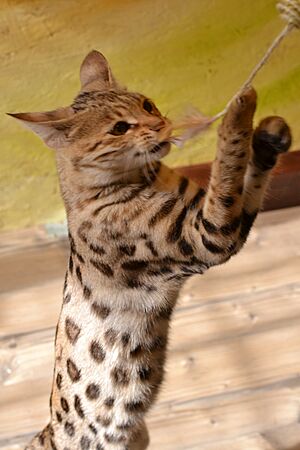Savannah cat facts for kids
Quick facts for kids Savannah |
|
|---|---|
 |
|
| Origin | United States |
| Breed standards | |
| TICA | standard |
| Notes | |
|
Savannahs are about the size of a medium dog
|
|
| Feline hybrid (Felis catus × Leptailurus serval) | |

The Savannah cat is a special breed of cat that looks a lot like a wild cat! It's about the size of a medium dog. This unique cat is a hybrid, which means it was created by mixing a wild cat called a serval with a regular domestic cat.
Contents
What Makes Savannah Cats Unique?
Savannah cats have long, slender bodies and long legs. When they stand, their back end is often a bit higher than their shoulders. They have a small head that is taller than it is wide, and a long, graceful neck.
Special Ear Markings
One cool thing about Savannahs is the bright markings on the back of their ears. These markings come from their wild ancestor, the serval cat. In the wild, these bright spots help serval kittens see where their mother is going, especially in tall grass. This is super helpful because servals can move very fast over large areas!
Amazing Jumping Skills
Wild serval cats can jump over 9 feet high from a standing start! Savannah cats also love to jump high, though how high depends on each individual cat. You might even find them jumping on top of doors or high shelves!
Love for Water and Play
Unlike many cats, Savannahs often love water. They are also very active and smart. They don't usually have many health problems, which is great! Sometimes, they make a hissing sound that sounds a bit like a snake.
Generations of Savannah Cats
The first generation of Savannah cats, called F1 hybrids, look the most like their wild serval parents. After that, most Savannahs are bred with other Savannahs. Sometimes, they are even bred with other cat breeds. These later generations might look a little less like a serval.
Where Savannah Cats Can Live
Because Savannah cats are part wild, they are not allowed in some places. For example, they are banned in Hawaii, Alabama, and some other U.S. states. They are also not allowed in Australia. This is because their larger size and wild instincts could be a risk to the native animals in those areas.
Images for kids
See also
 In Spanish: Savannah (gato) para niños
In Spanish: Savannah (gato) para niños
 | Charles R. Drew |
 | Benjamin Banneker |
 | Jane C. Wright |
 | Roger Arliner Young |






